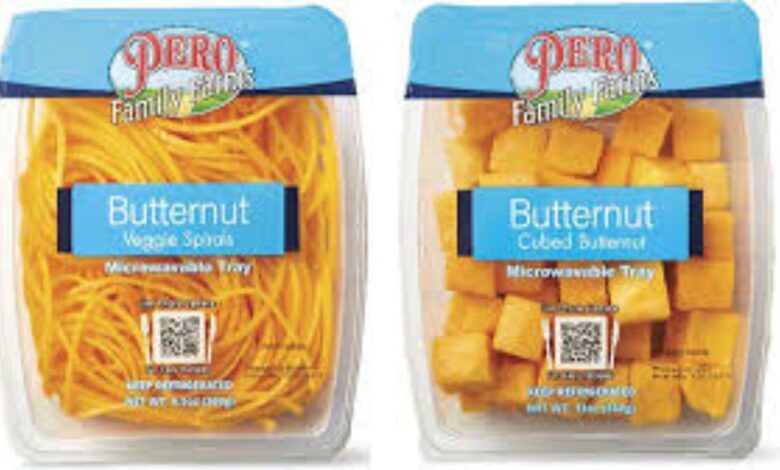Pero Family Farms Squash Recall: Listeria Risk Alert

Food recalls can send ripples across the grocery supply chain and public health systems, especially when they involve trusted brands and potentially dangerous pathogens. One such brand that recently made headlines is Pero Family Farms, a respected name in fresh produce. In late 2024 and earlier in 2021, the company initiated significant recalls related to its squash products due to concerns over Listeria monocytogenes contamination.
This article provides a detailed account of the incidents, public health risks, affected product details, official responses, and the broader implications for consumers and food safety stakeholders.
Who is Pero Family Farms?
Pero Family Farms Food Company, LLC, headquartered in Delray Beach, Florida, has been a prominent name in U.S. agriculture for over a century. The company is known for producing and packaging fresh-cut vegetables and healthy meal solutions distributed nationwide. Their product line includes green beans, mini sweet peppers, zucchini, butternut squash, and more.
Their commitment to quality has earned them a reliable presence in grocery stores and military commissaries alike. However, recent events surrounding squash recalls have cast a spotlight on the food safety vulnerabilities that even reputable producers can face.
Timeline of Recalls: Two Major Incidents
1. November 2024: Zucchini and Yellow Squash Recall
In November 2024, Pero Family Farms voluntarily recalled certain packages of Sliced Zucchini and Yellow Squash sold in 11 oz trays due to possible contamination with Listeria monocytogenes.
Key Details:
-
Product: 11 oz trays of sliced zucchini and yellow squash
-
UPC Code: 7489600976
-
Best If Used By Date: October 28, 2024
-
Distribution: Department of Defense Commissaries in Florida, Missouri, Illinois, and Virginia
-
Reason for Recall: Nonconforming lab test results showed possible Listeria presence
-
Recall Initiated: November 5, 2024
-
Public Announcement: November 6, 2024
-
Recall Source: DeCA Newsroom
Although no illnesses were reported, the proactive recall was executed out of an abundance of caution. The recall highlights the importance of rigorous product testing before distribution, especially when products are destined for institutions like military commissaries.
The DeCA (Defense Commissary Agency) responded by immediately removing the affected products from all affected store shelves and issuing customer alerts. Consumers who had already purchased the products were advised to return them to the place of purchase for a full refund.
2. January 2021: Butternut Squash Recall
Another notable recall occurred earlier on January 15, 2021, when Pero Family Farms initiated a voluntary recall of several fresh-cut butternut squash products following concerns of possible Listeria contamination.
Key Details:
-
Products: Butternut squash cubes, chunks, spirals, and steamable trays
-
Sizes: 9.5 oz, 10 oz, 12 oz, 13 oz, and bulk sizes up to 5 lbs
-
UPC Codes: Varied by packaging type
-
Distribution Dates: January 2 to January 11, 2021
-
States Affected: FL, LA, TX, NY, GA, VA, OH, MO, ME, and AL
-
Reason for Recall: Supplier Race West Company flagged potential Listeria in squash
-
Recall Source: FDA.gov Recall Notice
No illnesses were reported from this batch either, but the recall was swift and comprehensive. The company halted production and initiated an internal investigation to determine the contamination source.
Understanding the Health Risk: What Is Listeria?
Listeria monocytogenes is a bacterium that can cause listeriosis, a serious infection primarily affecting:
-
Pregnant women and their newborns
-
Older adults
-
Individuals with weakened immune systems
Symptoms of Listeriosis:
-
Fever
-
Muscle aches
-
Nausea or diarrhea
-
In severe cases, it may lead to meningitis, miscarriage, or even death
Listeria can grow in refrigerated conditions, which makes ready-to-eat vegetables like sliced squash particularly risky if not handled properly. According to the CDC, about 1,600 people get listeriosis each year in the U.S., and 260 die from the infection.
Hence, even if recalls seem minor or “precautionary,” they are essential from a public health perspective.
Why Recalls Happen: A Behind-the-Scenes Look
Food recalls often stem from a range of triggers:
-
Failed quality assurance tests
-
Supplier-sourced contamination
-
Consumer complaints
-
Government inspections
In both Pero Family Farms recalls, third-party testing and supplier notifications played a crucial role in initiating the recalls. This highlights how even large-scale, reputable producers can be impacted by failures in upstream supply chains.
The FDA encourages manufacturers to self-report and take corrective actions quickly, which is precisely what Pero Family Farms did.
Pero Family Farms’ Response and Industry Implications
The brand responded responsibly to both incidents. They:
-
Immediately halted production and distribution of affected products
-
Issued clear public advisories
-
Coordinated with FDA and military food safety agencies
-
Offered refunds and disposal instructions
These efforts reflect best practices in food safety crisis management. Nevertheless, the recalls serve as a cautionary tale for the entire food industry—especially fresh-cut produce suppliers who deal with perishable, high-risk foods.
Retailers, regulators, and consumers now pay closer attention to packaging labels, “best by” dates, and traceability practices than ever before.
Consumer Action: What Should You Do if You Have a Recalled Product?
If you believe you’ve purchased one of the recalled squash products:
-
Do not eat it—even if it looks and smells fine.
-
Check UPC codes and dates against official recall notices.
-
Dispose of it safely, or return it to the place of purchase for a refund.
-
Clean your refrigerator or surfaces that may have come into contact with the product.
-
Monitor your health, especially if you’re in a high-risk group.
Food Safety Tips for Consumers
-
Check Recall Alerts: Subscribe to FDA or USDA recall notifications.
-
Inspect Packaging: Look for signs of tampering or mold.
-
Follow Storage Guidelines: Keep squash and other produce refrigerated.
-
Cook Thoroughly: Listeria is killed at high cooking temperatures.
-
Use Produce Quickly: Don’t keep fresh-cut veggies past their expiration date.
The Broader Context: Are Recalls Increasing?
Yes. According to FDA data, food recalls have been rising, partly due to:
-
Improved testing methods
-
Greater transparency
-
Complex supply chains
-
Increased consumer reporting
This isn’t always bad—it shows the system is working to catch problems before they result in widespread illness.
For companies like Pero Family Farms, these events serve as an opportunity to rebuild consumer trust, improve internal QA processes, and review supplier standards.
Final Thoughts
The Pero Family Farms squash recalls are a reminder that food safety is a shared responsibility between suppliers, regulators, and consumers. While both 2021 and 2024 incidents were managed proactively and without reported illness, they highlight the ongoing vulnerabilities in fresh produce supply chains—especially where pre-cut and packaged vegetables are concerned.
As consumers, staying informed, reading labels, and following food safety guidance can significantly reduce your risk.
For businesses, the challenge lies in building transparent, traceable, and resilient supply networks that can prevent, detect, and manage food safety risks efficiently.
In a world where convenience and health go hand in hand, fresh-cut produce like zucchini, yellow squash, and butternut squash are pantry staples for many families. Brands like Pero Family Farms are generally trusted names—but even they are not immune to the complexities of modern food safety. Staying alert and acting responsibly—whether you’re a business or a buyer—is key to keeping food on our tables safe and healthy.
For more real-time updates, food safety stories, and industry news, visit The Globe Gist, where we dive deep into the headlines that matter.



